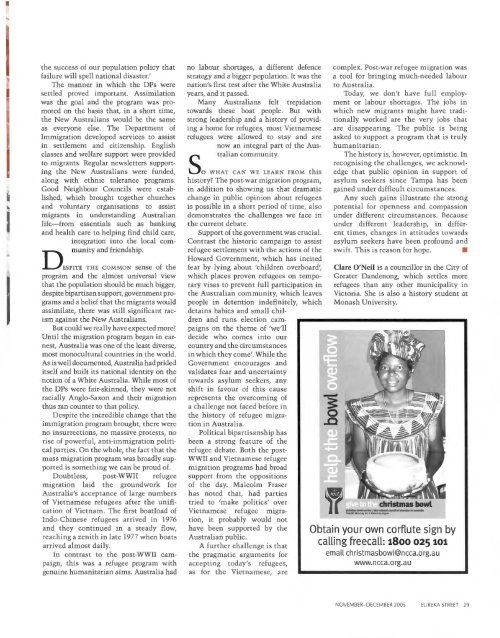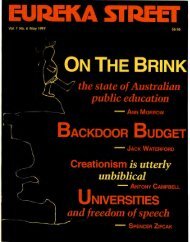0 - Eureka Street
0 - Eureka Street
0 - Eureka Street
You also want an ePaper? Increase the reach of your titles
YUMPU automatically turns print PDFs into web optimized ePapers that Google loves.
•<br />
the success of our population policy that<br />
failure will spell national disaster.'<br />
The manner in which the DPs were<br />
settled proved important. Assimilation<br />
was the goal and the program was promoted<br />
on the basis that, in a short time,<br />
the New Australians would be the same<br />
as everyone else. The Department of<br />
Immigration developed services to assist<br />
in settlement and citizen hip. English<br />
classes and welfare support were provided<br />
to migrants. Regular newsletters supporting<br />
the New Australians were funded,<br />
along with ethnic tolerance programs.<br />
Good Neighbour Councils were established,<br />
which brought together churches<br />
and voluntary organisations to assist<br />
migrants in understanding Australian<br />
life-from essentials such as ban king<br />
and health care to helping find child care,<br />
integration into the local community<br />
and friendship.<br />
D<br />
ESPITE THE COMMON sense of the<br />
program and the almost universal view<br />
that the population should be much bigger,<br />
despite bipartisan support, government programs<br />
and a belief that the migrants would<br />
assimilate, there was still significant racism<br />
against the New Australians.<br />
But could we really have expected more<br />
Until the migration program began in earnest,<br />
Australia was one of the least diverse,<br />
most monocultural countries in the world.<br />
As is well documented, Australia had prided<br />
itself and bu ilt its national identity on the<br />
notion of a Wh ite Australia. While most of<br />
the DPs were fair-skinned, they were not<br />
racially Anglo-Saxon and their migration<br />
thus ran counter to that policy.<br />
Despite the incredible change that the<br />
immigration program brought, there were<br />
no insurrections, no massive protests, no<br />
rise of powerful, anti-immigration political<br />
parties. On the whole, the fact that the<br />
mass migration program was broadly supported<br />
is something we can be proud of.<br />
Doubtless, post-WWII refugee<br />
migration laid the groundwork for<br />
Australia's acceptance of large numbers<br />
of Vietnamese refugees after the unification<br />
of Vietnam. The first boatload of<br />
Indo-Chinese refugees arrived in 1976<br />
and they continued in a steady flow,<br />
reaching a zenith in late 1977 when boats<br />
arrived almost daily.<br />
In contrast to the post-WWII campaign,<br />
this was a refugee program with<br />
genuine humanitarian aims. Australia had<br />
no labour shortages, a different defence<br />
strategy and a bigger population. It was the<br />
nation's first test after the White Australia<br />
years, and it passed.<br />
Many Australians felt trepidation<br />
towards these boat people. But with<br />
strong leadership and a history of providing<br />
a home for refugees, most Vietnamese<br />
refugees were allowed to stay and are<br />
s<br />
now an integral part of the Aus-<br />
tralian community.<br />
0 WHAT CAN WE LEARN FROM this<br />
history The post-war migration program,<br />
in addition to showing us that dramatic<br />
change in public opinion about refugees<br />
is possible in a short period of time, also<br />
demonstrates the challenges we face in<br />
the current debate.<br />
Support of the government was crucial.<br />
Contrast the historic campaign to assist<br />
refugee settlement with the actions of the<br />
Howard Government, which has incited<br />
fear by lying about 'children overboard',<br />
which places proven refugees on temporary<br />
visas to prevent full participation in<br />
the Australian community, which leaves<br />
people in detention indefinitely, which<br />
detains babies and small children<br />
and runs election campaigns<br />
on the theme of 'we'll<br />
decide who comes into our<br />
country and t he circumstances<br />
in which they come'. While the<br />
Government encourages and<br />
validates fear and uncertainty<br />
towards asylum seekers, any<br />
shift in favour of this cause<br />
represents the overcoming of<br />
a challenge not faced before in<br />
the history of refugee migration<br />
in Australia.<br />
Political bipartisanship has<br />
been a strong feature of the<br />
refugee debate. Both the post<br />
WWII and Vietnamese refugee<br />
migration programs had broad<br />
support from the oppositions<br />
of the day. Malcolm Fraser<br />
has noted that, had parties<br />
tried to 'make politics' over<br />
Vietnamese refugee migration,<br />
it probably would not<br />
have been supported by the<br />
Australian public.<br />
A further challenge is that<br />
the pragmatic arguments for<br />
complex. Post-war refugee migration was<br />
a tool for bringing much-needed labour<br />
to Australia.<br />
Today, we don't have full employment<br />
or labour shortages. The jobs in<br />
which new migrants might have traditionally<br />
worked are the very jobs that<br />
are disappearing. The public is being<br />
asked to support a program that is truly<br />
humanitarian.<br />
The history is, however, optimistic. In<br />
recognising the challenges, we acknowledge<br />
that public opinion in support of<br />
asylum seekers since Tampa has been<br />
gained under difficult circumstances.<br />
Any such gains illustrate the strong<br />
potential for openness and compassion<br />
under different circumstances. Because<br />
under different leadership, in different<br />
times, changes in attitudes towards<br />
asylum seekers have been profound and<br />
swift. This is reason for hope. •<br />
Clare O'Neil is a councillor in the City of<br />
Greater Dandenong, which settles more<br />
refugees than any other municipality in<br />
Victoria. She is also a history student at<br />
Monash University.<br />
Obtain your own corflute sign by<br />
calling freecall: 18oo 025 101<br />
email christmasbowl@ncca.org.au<br />
accepting today's refugees, www.ncca.org.au<br />
as for the Vietnamese, are<br />
NOVEMBER- DECEMBER 2005 EURE KA STREET 29
















